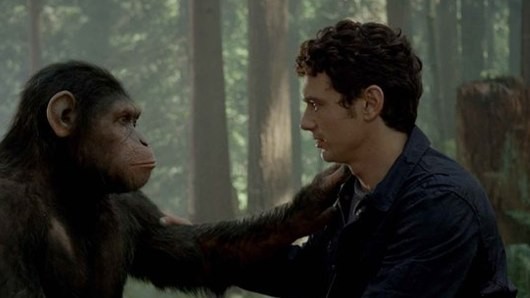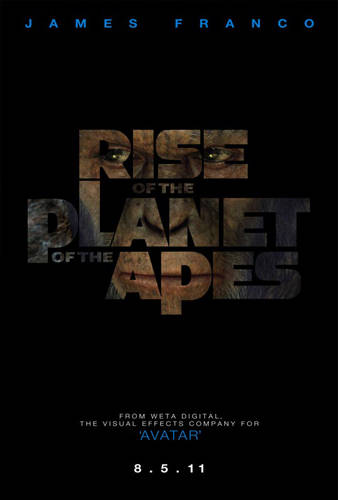Movie Review: Rise of the Planet of the Apes
- Details
- Category: New Series and Movie Reviews
- Published: Thursday, 04 August 2011 22:23
- Written by Lupe Haas

RISE OF THE PLANET OF THE APES is a powerful movie. As someone who was raised with the Ape’s franchise I do not make this statement lightly. I hold this film to a very high standard and although there are a few things that I found fault with there is one scene that is so electric that the hair on my arms literally stood up. On this basis alone I recommend this film.
The strength of RISE OF THE PLANET OF THE APES is in its humanity. In the original Planet of the Apes star Roddy McDowall was able to convey his humanity through a latex mask and heavy make-up by using his posture and soulful eyes. In this film Andy Serkis does the same using the latest, state-of-the-art, motion-capture techniques. This film is capitalizing on the advances made by the groundbreaking movie Avatar. Taking it one step further Rise has created a portable MoCap unit being the first to film in a natural setting and in direct sunlight. This innovation frees them from the confinement of the soundstage and opens new possibilities. But when I speak of the humanity of the film I am also talking about the human actors, whether it’s live action or CGI, there are some really good performances in this film.
RISE OF THE PLANET OF THE APES centers on a scientist (James Franco) who has dedicated his life to finding a cure for Alzheimer’s. His own father (John Lithgow) suffers from the disease and Will (Franco) has now become his father’s sole caregiver. With a focus boarding on obsession, Will has developed a benign drug-carrying virus that repairs damaged brain tissue. However, he has also discovered that in apes without brain damage, it actually increases brain function. In other words, the apes are getting smarter.
When a lab accident occurs, forcing the company to destroy all its test animals, the lead ape handler, Robert Franklin (Tyler Labine) is burdened with the loathsome task of putting the animals down. But while carrying out this despicable duty he discovers a baby chimp that is not on the company records. In an act of compassion he begs Will to take the baby with him until he can find it a home. Will reluctantly agrees but becomes attached to the little guy. Caesar has found a new father in Will.
It doesn’t take long for Will to discover that Caesar is no ordinary ape. His blood work reveals that he inherited the virus from his mother and his growth and intelligence is exponential. Will secretly carries on his work at home and even starts human trials on his father without clearance. When the cure appears to be working, Will admits to his supervisor what he has done. His boss (David Oyelowo) eager to make a profit overlooks Will’s breech of ethics and agrees to start a new trial. More apes are secured for testing and the vicious cycle renews.
Back home things are beginning to go wrong and Caesar’s existence has become publicly known. Thrown into a local primate sanctuary, which is little more than an ape prison, Caesar learns about brutality, violence, prejudice and hate. He uses his intelligence to survive his incarceration and eventually rises to become an ape leader. Caesar learns that he is now among his own and his own have been sorely mistreated.
 RISE OF THE PLANET OF THE APES is an origin story that attempts to explain how apes grew to rule the earth. It is an ambitious project that couldn’t be made before because the technology needed to tell the story wasn’t available. We have come a long way since latex masks and hairy suits. But with the magic of motion-capture, Andy Serkis is able to age from a baby chimp into a fully mature chimpanzee. Mo-Cap also allows him to convey intelligence, emotion and a full range of movement, something that the restrictive methods of the sixties could not do.
RISE OF THE PLANET OF THE APES is an origin story that attempts to explain how apes grew to rule the earth. It is an ambitious project that couldn’t be made before because the technology needed to tell the story wasn’t available. We have come a long way since latex masks and hairy suits. But with the magic of motion-capture, Andy Serkis is able to age from a baby chimp into a fully mature chimpanzee. Mo-Cap also allows him to convey intelligence, emotion and a full range of movement, something that the restrictive methods of the sixties could not do.
If you ignored the science-fiction element and all the special effects, RISE OF THE PLANET OF THE APES is really a father-son story. John Lithgow gives an elegant performance as a man struggling with dementia. His performance is meticulous as he shows varying stages of Alzheimer disease. He is also very touching as he develops a bond with his simian grandson, Caesar. For Franco, saving John’s character from Alzheimer’s is a very strong motivator. He also has formed a strong attachment to Caesar who becomes like a son to him.
Another nice performance, although understated, is as Caroline Aranha, a veterinarian with an affinity for chimps. She is the voice of reason in this strange father-son story, but her affection for both Will and Caesar turns her into a surrogate mom. Until now Will has been too focused to let anyone in. But Caroline knows his secret and wants to help. She is the only one who has been able to get past his cold exterior. The four of them have become a strange family.
Another strong performance is Tom Felton as a nasty, sadistic keeper who loves to torment apes. His father, Brian Cox runs the ape sanctuary but he seems to be blind to his son’s behavior. He also seems to be blind to his original purpose and the condition of his establishment. He is not above taking bribes or selling his charges back to research facilities. We don’t know much about this despicable man, we only know that somewhere he lost his way.
When it comes to the CGI and the motion-capture work, the apes are extremely well done and photo-realistic. However, some species do look better than others. The orangutan is flawless and looks completely real and the Silverback gorilla looks great too. But when it comes to the chimpanzees, some look better than others. There is one old chimp that looks so familiar to me that I wondered if I saw him in a film before. Then I remembered that they are all computer generated so they probably used this chimp as a model. As far as Caesar is concerned I felt that they went too humanoid with him. At times he lost his simian qualities.
I loved how each ape was different with their own look and personality. This really helps you identify with them and see them as individuals. It also helps you understand their plight and causes you to be sympathetic. It is funny how in a movie pitting apes against humans that we end up rooting for the other side. How is intelligent is that? But that is the power of film and science fiction. It allows us to look at things from another perspective and see them with fresh eyes.
Planet of the Apes is about equality, prejudice, segregation and the hubris of science, themes that were tackled in 1963 and are still being tackled today. My question is how many films do we have to make before we learn our lesson? Apparently, one more, and like its predecessors RISE OF THE PLANET OF THE APES will make you think.
Melanie Wilson visit her blog at lamelbox.blogspot.com